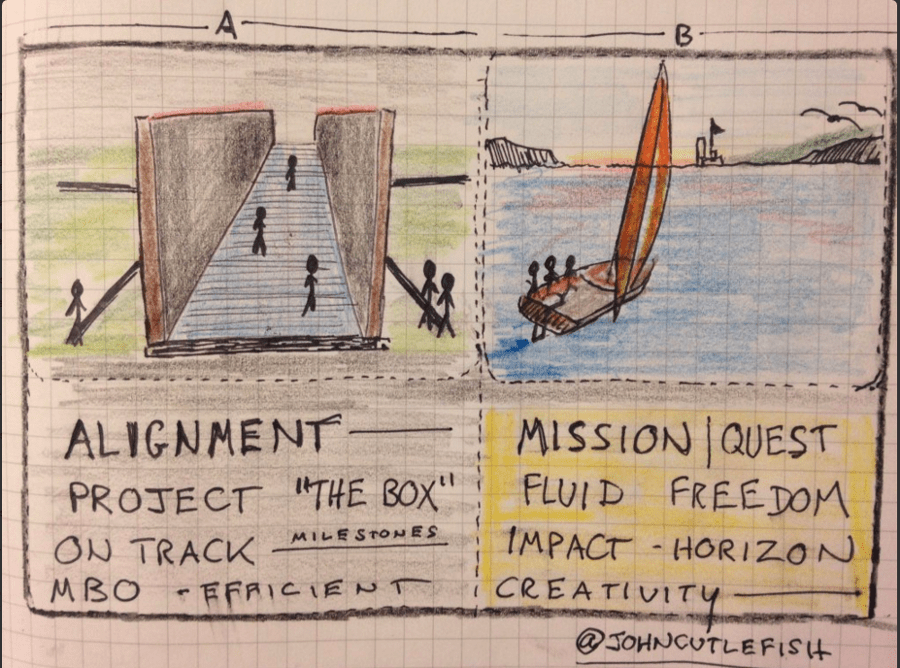Age of Product’s Food for Thought of April 24th, 2016 covers how to get an agile product roadmap right, the attention “agile” is enjoying in HBR, eleven habits of high-performing agile teams, and why human psychology is usually an impediment to agile adoption.
We explore ways to talk management out of business plans when innovating, how to create a culture for innovation IDEO style, why product should talk more to sales, and what makes people love your products.
Last, but least, we cover continuous user testing, how to retire products with style, that you’re absolutely not to blame for procrastination—it’s in your genes—, and how Amazon turned a dud into a mega-seller: Echo.
Essential Reads
(via Shopify): Procrastination, Explained by Science
Dayna on why you should not be too hard on yourself—procrastination is mostly biology and you’re not really to blame falling for it.
(via Bloomberg): The Real Story of How Amazon Built the Echo
Joshua on the talking speaker started as part of a secret augmented-reality project and ended up as a surprise hit.
From the Blog: The Agile Product Roadmap
(via Age of Product): Product Roadmap Failure: Stop Setting Them Up To Fail

John on how to build roadmaps that will be successful.
Agile & Scrum
(via Medium): The 11 habits of highly effective Agile delivery teams
Amit lists eleven best practices of high-performing agile teams, from ‘work in progress limits’ to ‘understand the business value of technical tasks’.
(via Forbes): HBR's Embrace Of Agile
Steve on the flood of attention, ‘Agile’ is currently receiving from established traditional publications such as Harvard Business Review.
(via Medium): How One Jira Ticket Made My Employer $1MM/Month: 7 Metrics that Actually Matter
Eric shares his take on worthwhile metrics in software development.
Forget points. Forget estimates and commitments. Estimates are all worthless lies. Try weekly demos, instead.
(via InfoQ): Agile Adoption: #LearningIsHorrible, and Other Harsh Realities
Jeffrey on how human psychology works against successful agile adoption and that seeking excellence in agile development requires difficult emotional work.
(via Strategyzer): How To Convince Leaders To Avoid Business Plans When Validating New Ideas
Kavi on how to convince leadership to move away from business planning, and to embrace a culture of testing for new business ideas.
Scott Cook, founder of Intuit: Behind every big failure at out company, there was marvelous spreadsheet.
(via Co.Design): Ideo: The 7 Most Important Hires For Creating A Culture Of Innovation
Mollie—an organizational designer with IDEO—describes the seven roles that make or break the creation of a culture of innovation.
Product & Lean
(via Close.io): Hey product, your salespeople know something you don't
Jo on the importance of product managers and sales people to start talking with each other much more intensely to provide the best products and customer experience.
(via Medium): Why People Buy Things, and How to Make Consumers Fall in Love with Your Products
Amrit provides a brief, yet insightful overview on the psychology of buying things.
(via User Testing Blog): How to integrate continuous user testing into your product development workflow
Edmond on Quip’ lessons from the trenches on how to integrate continuous user testing into the product development workflow to iterate faster and more incrementally.
(via Medium): Designing complex products
Erik on managing the complexity of product design and development.
: A Methodology for Retiring Products
Rimas on creating and curating a great experiences for your customers by retiring obsolete features in a structured, non-NEST-ish way.

